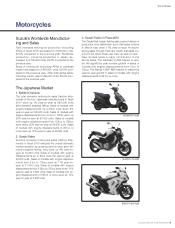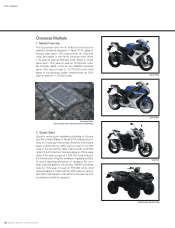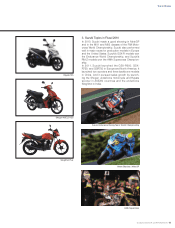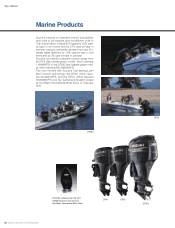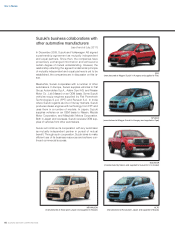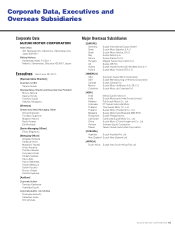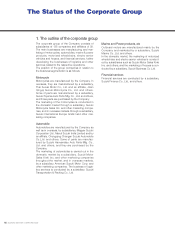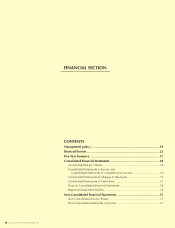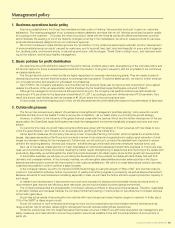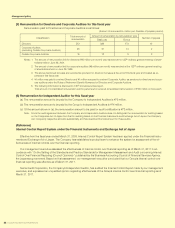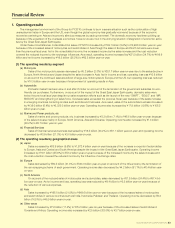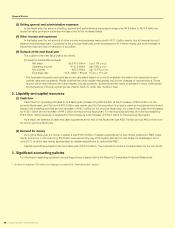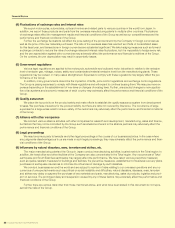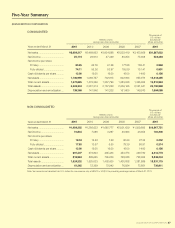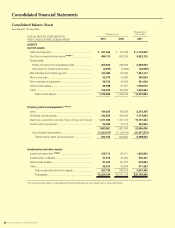Suzuki 2011 Annual Report Download - page 20
Download and view the complete annual report
Please find page 20 of the 2011 Suzuki annual report below. You can navigate through the pages in the report by either clicking on the pages listed below, or by using the keyword search tool below to find specific information within the annual report.
SUZUKI MOTOR CORPORATION 19
Management policy
1. Business operations basic policy
Ever since establishment, the Group has maintained a basic policy of making “value-packed products” to give our customers
satisfaction. The opening paragraph of our company’s mission statement promises that we will “develop products of superior quality
by focusing on the customer”. Of course, the value of a product varies with the times as well as the differences between countries
and in lifestyles. By keeping on top of the dynamic changes occurring in the marketplace, we strive to create products of real value,
products that are always designed to win our customers’ approval.
We commit ourselves to make efforts to promote the “production of mini, small and subcompact vehicles” and the “development
of environmentally benign products” needed by customers, and to be small, less, light, short and beautiful on every side of organiza-
tion, facilities, parts, environment and so on as well as production, with the slogan, “Small Cars for a Big Future”, and has been work-
ing for the efficient, well-knit and healthy management.
2. Basic policies for profit distribution
We determine the profit distribution based on the performances, dividend payout ratio, strengthening of the corporate nature and
full internal reserve for future business developments from the medium- to long-term viewpoint, with the emphasis on the continuous
and stable distribution.
The Group has a structure in which profits are highly dependent on overseas manufacturing plants. They are mainly located in
developing countries, and are therefore subject to exchange rate fluctuations. To achieve stable growth, we need to further enhance
our corporate structure and prepare for unforeseen circumstances.
As to FY2010, the Company was able to record profits over the previous fiscal year by vigorous cost reductions in every aspect
despite the influence of the yen appreciation and the shutdown by the Great East Japan Earthquake occurred in March.
Although the management environment is still expected to be grim, the Company has paid this total annual cash dividends
amounting to ¥13 per share for the fiscal year ended March 31, 2011, accordingly, year-end dividends were ¥7.00 per share. As a
result, this annual cash dividends were an increase of ¥1.00 per share from the previous fiscal year.
In future years, under the foregoing point of view, we will also determine the profit distribution based on the performance of fiscal year.
3. Outstanding issues
The Group has reviewed every aspect of business and strengthened management practices placing “Let’s review the current
practices and stay true to the basics in order to survive the competition.” as our basic policy in promoting the growth strategy.
However, in addition to the influence of the global financial crises after the Lehman Shock and the further development of the yen
appreciation, the Great East Japan Earthquake has made the management environment drastically changed and more and more
severe.
To overcome this crisis, we would make concerted efforts as a group with the slogan of “Exert ourselves with new ideas to over-
come the great difficulty.” and “Restart in our all operations to get through this critical time.”
As the specific measures, the Company has set up a new “Corporate Planning Committee” which compiles the important chal-
lenges, discusses issues about the Group and conducts a review of structures and organizations to realize quick extraction of chal-
lenges and decision-making for the management. Furthermore, we will continue to promote the establishment of system to ensure
profits in the declining sales by “internal cost reduction” activities through which each and every employee reduces every cost.
Next, as for the issues challenged by our major businesses of motorcycle business and automobile business, in motorcycle busi-
ness, we will promote launching of products meeting the market needs, strengthening of sales forces and improving of the quality and
productivity. Especially, we will strengthen the small motorcycle business in the Asian region where further growth can be expected.
In automobile business, we will keep on promoting the development of the products and sales activities closely tied with both
domestic and overseas markets. In the domestic markets, we will strengthen sales abilities and after sales activities in the Suzuki
sales shops nationwide to promote the improvement of the customer satisfaction. We will try to create sales shops loved by as many
customers as possible in order to achieve a sales increase.
In the overseas markets, we will try to improve SUZUKI brand image by using the slogan of “Way of life!” and promote local pro-
curement, cost reduction activities, further improvement of quality and further progress in productivity, as well as sales enhancement.
Because demands for automobiles are increasing especially in Asia, we will make the further efforts to expand production capacity in
such areas.
In research and development, it has become more and more important to develop environmentally friendly products which re-
duce emission gas, improve fuel efficiency, save resources, can be recycled easily to protect global environment.
The Company believes that the popularization of compact vehicles contribute to solve environmental issues. Therefore, regardless
of domestic markets and overseas markets, the Company thinks that focusing on improvement of fuel efficiency of compact vehicles
is the most urgent issue.
Suzuki has actual results of launching the mini vehicles with hybrid engine and direct-injection engine to markets. In India, about
70% of the SWIFT is diesel engine model.
Suzuki will continue to work to develop technology for more low-fuel consumption and low-emission electric vehicles such as
range extender, hybrid vehicles, diesel engine vehicles and fuel-cell vehicles utilizing these experiences.
Under the experiences from the Great East Japan Earthquake occurred in March, we will further strengthen risk management and
safety measures, and make efforts to recover the production as soon as possible in line with the actual situation of procurement of
parts, etc.


